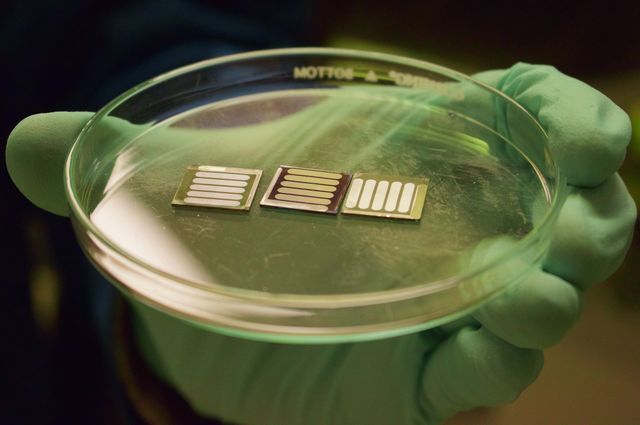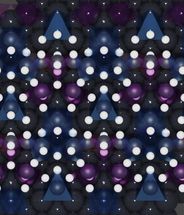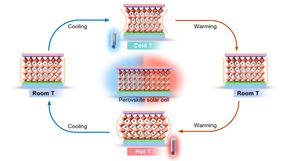Next-generation perovskite solar cells made stable by metal oxide “sandwich”
Perovskite solar cells with metal oxide hole and electron transport layers
UCLA professor Yang Yang, member of the California NanoSystems Institute , is a world-renowned innovator of solar cell technology whose team in recent years has developed next-generation solar cells constructed of perovskite, which has remarkable efficiency converting sunlight to electricity.

Perovskite solar cells with metal oxide hole and electron transport layers.
Tunde Akinloye/CNSI
Despite this success, the delicate nature of perovskite — a very light, flexible, organic-inorganic hybrid material — stalled further development toward its commercialized use. When exposed to air, perovskite cells broke down and disintegrated within a few hours to few days. The cells deteriorated even faster when also exposed to moisture, mainly due to the hydroscopic nature of the perovskite.
Now Yang’s team has conquered the primary difficulty of perovskite by protecting it between two layers of metal oxide. This is a significant advance toward stabilizing perovskite solar cells. Their new cell construction extends the cell’s effective life in air by more than 10 times, with only a marginal loss of efficiency converting sunlight to electricity.
“There has been much optimism about perovskite solar cell technology,” graduate student Lei Meng said. In less than two years, the Yang team has advanced perovskite solar cell efficiency from less than 1 percent to close to 20 percent. “But its short lifespan was a limiting factor we have been trying to improve on since developing perovskite cells with high efficiency.”
Yang, who holds the Carol and Lawrence E. Tannas, Jr., Endowed Chair in Engineering at UCLA, said there are several factors that lead to quick deterioration in normally layered perovskite solar cells. The most significant, Yang said, was that the widely used top organic buffer layer has poor stability and can’t effectively protect the perovskite layer from moisture in the air, speeding cell degradation. The buffer layers are important to cell construction because electricity generated by the cell is extracted through them.
Meng said that in this study the team replaced those organic layers with metal oxide layers that sandwich the perovskite layer, protecting it from moisture. The difference was dramatic. The metal oxide cells lasted 60 days in open-air storage at room temperature, retaining 90 percent of their original solar conversion efficiency. “With this technique perfected we have significantly enhanced the stability.”
The next step for the Yang team is to make the metal oxide layers more condensed for better efficiency and seal the solar cell for even longer life with no loss of efficiency. Yang expects that this process can be scaled up to large production now that the main perovskite problem has been solved.
Original publication
Jingbi You, Lei Meng, Tze-Bin Song, Tzung-Fang Guo, Yang (Michael) Yang, Wei-Hsuan Chang, Ziruo Hong, Huajun Chen, Huanping Zhou, Qi Chen, Yongsheng Liu, Nicholas De Marco & Yang Yang; "Improved air stability of perovskite solar cells via solution-processed metal oxide transport layers"; Nature Nanotechnology; 2015
Most read news
Original publication
Jingbi You, Lei Meng, Tze-Bin Song, Tzung-Fang Guo, Yang (Michael) Yang, Wei-Hsuan Chang, Ziruo Hong, Huajun Chen, Huanping Zhou, Qi Chen, Yongsheng Liu, Nicholas De Marco & Yang Yang; "Improved air stability of perovskite solar cells via solution-processed metal oxide transport layers"; Nature Nanotechnology; 2015
Organizations
Other news from the department science

Get the chemical industry in your inbox
By submitting this form you agree that LUMITOS AG will send you the newsletter(s) selected above by email. Your data will not be passed on to third parties. Your data will be stored and processed in accordance with our data protection regulations. LUMITOS may contact you by email for the purpose of advertising or market and opinion surveys. You can revoke your consent at any time without giving reasons to LUMITOS AG, Ernst-Augustin-Str. 2, 12489 Berlin, Germany or by e-mail at revoke@lumitos.com with effect for the future. In addition, each email contains a link to unsubscribe from the corresponding newsletter.




















































